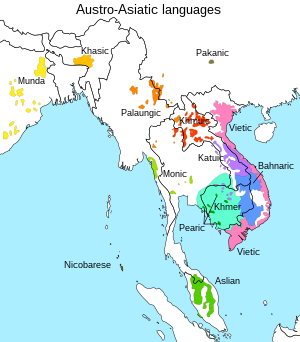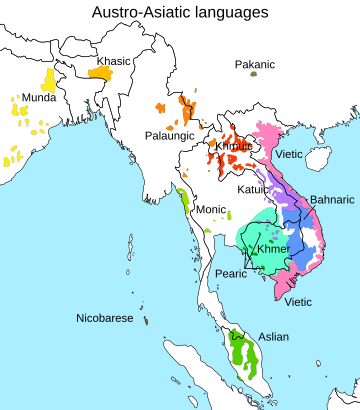The Pearic languages (alternatively called the Chongic languages[1]) are a group of endangered languages of the Eastern Mon–Khmer branch of the Austroasiatic language family, spoken by Pear people (the Por, the Samré, the Samray, the Suoy, and the Chong) living in western Cambodia and eastern Thailand.[2][3]
This article should specify the language of its non-English content, using {{lang}}, {{transliteration}} for transliterated languages, and {{IPA}} for phonetic transcriptions, with an appropriate ISO 639 code. Wikipedia's multilingual support templates may also be used. (May 2019) |
| Pearic | |
|---|---|
| Chongic | |
| Geographic distribution | Indochina |
| Linguistic classification | Austroasiatic
|
| Proto-language | Proto-Pearic |
| Subdivisions |
|
| Glottolog | pear1246 |
 Pearic | |
Pearic languages are remnants of the aboriginal languages of much of Cambodia, but have dwindled in numbers due to assimilation. "Pear" is a pejorative term meaning 'slave' or 'caste'.
Classification
Paul Sidwell proposed the following classification of the Pearic languages in Sidwell (2009:137), synthesizing analyses from Headley (1985), Choosri (2002), Martin (1974), and Peiros (2004)[4] He divides Pearic into two primary branches (Pear and Chong), with Chong being further divided into four groups.
- Pearic
- Pear of Kompong Thom (Baradat ms.)
- Chong
- Southern
- Suoi of Kampong Speu (Pannetier ms., Baradat ms.)
- Saoch, two dialects:
- Chung of Cambodia - Phum Veal Renh, Prey Nob District in Kampong Som (Isara Chooseri 2007), (Pannetier ms.)
- Chung of Thailand - Kanchanaburi (Isara Chooseri 2007)
- Western
- Chong of Chantaburi (Baradat ms.)
-
- Chong həəp (Martin 1974)
- Khlong Phlu Chong (Siripen Ungsitibonporn 2001)
-
- Chong lɔɔ (Martin 1974)
- Wang Kraphrae Chong (Siripen Ungsitibonporn 2001)
- Chong (Huffman 1983)
- Central
- Samre of Pursat
- Samre (Pornsawan Ploykaew 2001)
- Chong (Baradat ms.)
- Kasong (Noppawan Thongkham 2003), historically called, Chong of Trat (Pannetier ms., Isarangura 1935)
- Northern (Somray)
- Somray of Battambang (Baradat ms.)
- Somre of Siem Reap [nearly extinct] (Moura 1883)
- Southern
Pearic lexical innovations include 'fish', 'moon', 'water leech', 'chicken', and 'fire'.[5]
Reconstruction
Headley (1985)
The Proto-Pearic language, the reconstructed ancestor of the Pearic languages, has been reconstructed by Robert Headley (1985).[6] The 149 Proto-Pearic forms below are from Headley (1985).
- *peːm 'angry'
- *pe(ː)ʔ 'three'
- *taːɲ 'to weave'
- *kam 'arrow'
- *keːv 'to call'
- *caː 'to eat'
- *ciʔ 'louse'
- *ʔic 'excrement'
- *ʔan 'here'
- *Pa(ː)ŋ 'flower'
- *Poːt 'to cut, hack'
- *Tɔːŋ 'to fear'
- *Teːv 'right (dexter)'
- *Cak 'to hunt'
- *Ceːv 'to go'
- *Kaːŋ 'month'
- *Kɔːj 'long(time)'
- *Kic 'small'
- *buːl 'drunk'
- *beːt(?) 'knife'
- *baːŋ 'morning'
- *dɔːn 'must'
- *deːv 'to buy'
- *daːk 'water'
- *ɟuːm 'vine'
- *ɟeːv 'soup'
- *ɟɔːr 'sap'
- *graːɲ 'alcohol'
- *gɨl 'to sit'
- *guːm 'to winnow'
- *suk 'hair'
- *saŋ 'to hear'
- *sɔːŋ 'to dance'
- *huːm 'to bathe'
- *hɔː 'not'
- *h(ɨː)r 'to fly'
- *hjɔk 'breast'
- *hmɔːk 'bat'
- *hmaːr 'field'
- *hnoːk 'to stretch oneself'
- *hŋɔːn 'thatch'
- *hrɔːk 'to hide'
- *hlɔːŋ 'banana'
- *hluk 'salt'
- *v(ɛː)ŋ 'raw, uncooked'
- *rəvaːj 'tiger'
- *jaːv 'scorpion'
- *j(i)p 'to come'
- *m(a)t 'eye'
- *nɔːŋ 'mountain'
- *nɨm 'year'
- *ŋ(əː)r 'red'
- *reːs 'root'
- *rɔːj 'fly'
- *raːj 'ten'
- *loːm 'to ask'
- *laːc 'lightning'
- *_liɲ 'elder sibling'
- *Pac 'to break'
- *hoːc 'dead'
- *hoːc 'dead'
- *pah 'to slap'
- *c(u)h 'to spit'
- *tak 'broken apart'
- *lɨk 'bran'
- *-haːm 'blood'
- *tɨm 'to cook'
- *k(eː)n 'child'
- *kɨn 'female'
- *hlɨŋ 'deep'
- *ɟiɲ 'foot'
- *ʔɔːɲ 'to keep, put'
- *Təp 'to bury'
- *h(ɔː)p 'to eat'
- *veːt 'blue'
- *klaːv 'skink'
- *knaːj 'elephant'
- *Tɔːj 'before'
- *sɨl 'sharp-edged'
- *taːl 'to stand'
- *coːl 'to plant'
- *meːl 'fish'
- *Peːr 'water leech'
- *Keːr 'to bark'
- *h(oː)r 'to blow'
- *Ceːs 'kind of deer'
- *loːs 'kind of deer'
- *coːs 'hundred'
- *cɨs 'old'
- *pa(ː)s 'tail'
- *c(ɔ)ʔ 'dog'
- *rəgiʔ 'thin'
- *tŋiʔ 'day'
- *poʔ 'dream'
- *teˀ 'earth'
- *(c)kaː 'mouth'
- *(c)mɨː 'civet'
- *(c)ŋ(ɨ)n 'wife'
- *(c)rɛːŋ 'ring'
- *ɟrəlaʔ 'thorn'
- *kdɔːŋ 'six'
- *kleˀ 'ashamed'
- *klɔːŋ 'bone'
- *kmaːs 'smoke'
- *kmɔk 'cough'
- *gmaʔ 'rain'
- *knɔːk 'to flail'
- *gnuːl 'seven'
- *grɨk 'to awaken'
- *ks(ɨ)m 'star'
- *kvak 'to hook'
- *kjoŋ 'kind of lizard'
- *gjaːŋ 'turtle'
- *ml(ɔː)ŋ 'eel'
- *pliː 'fruit'
- *bluː 'thigh'
- *pnaːk 'basket'
- *bnaːm 'ugly'
- *(p)ŋaːm 'bee'
- *brɔːŋ 'Khmer'
- *braːj 'cotton thread'
- *psiː 'snake'
- *skɛːŋ 'wing'
- *smaɲ 'cramp'
- *snɛːŋ 'after'
- *sŋal 'to know'
- *sriː 'to ask'
- *tmoˀ 'stone'
- *tpɔʔ 'winnowing basket'
- *trɔːj 'wild cow'
- *ʔiːn 'to get'
- *briː 'forest'
- *kriɲ 'drum'
- *ksuː 'red ant'
- *bleːv 'fire'
- *ləkheːt 'to slide'
- *ʔoːc 'to take'
- *Coːj 'sore, wound'
- *Toːs 'head'
- *koːj 'tooth'
- *(m)oːt 'younger sibling'
- *b(oː) 'you'
- *koj 'kind of lizard'
- *hlɛːk 'chicken'
- *Tɛːŋ 'left'
- *bɛːk 'to laugh'
- *tɛ(h) 'lightning'
- *gɔŋ 'long'
- *tɔŋ 'house'
Sidwell & Rau (2015)
The following Proto-Pearic lexical proto-forms have been reconstructed by Sidwell & Rau (2015: 303, 340-363).[5]
- *ʔɨːs 'all'
- *bɔh 'ashes'
- *ker 'to bark'
- *tkɔːˀ 'bark (of tree)'
- *guŋ 'belly'
- *tak 'big'
- *ciːˀm 'bird'
- *tap 'to bite'
- *caˀŋ 'black'
- *pNhaːm 'blood'
- *klɔːŋ 'bone'
- *j̊ɔk, *tuh 'breast'
- *pɔːs, *tuːt 'to burn (vt.)'
- *ktraːˀs 'claw/nail'
- *juːr 'cloud'
- *saˀc 'cold'
- *jip 'to come/arrive'
- *hoːc 'die (of a person)'
- *cɔː 'dog'
- *taːˀl 'to drink (water)'
- *bah, *jeːˀs 'dry (adj./stat.)'
- *prlaːŋ 'ear'
- *teːˀ 'earth/soil'
- *caː 'to eat'
- *tuŋ 'egg'
- *mat 'eye'
- *pɨːs 'fat/grease/oil'
- *suk 'feather'
- *pliːw 'fire'
- *meːˀl 'fish (n.)'
- *hɨːr 'fly (v.)'
- *ɟɨŋ 'foot'
- *briː 'forest'
- *bɔːŋ 'full (vessel)'
- *ʔɨs 'give'
- *ceːw 'to go'
- toːˀn 'good'
- *weːt 'green'
- *suk 'hair (of head)'
- *tiː 'hand'
- *saŋ 'to hear/listen'
- *soːc, *sroːc 'horn'
- *ʔiɲ 'I'
- *pNhoːc 'to kill'
- *-nuːl, *mkuːr 'knee'
- *kah 'know'
- *-laːˀ 'leaf'
- *bic 'to lie (down)'
- *lɔːm 'liver'
- *goŋ 'long'
- *ciː 'louse (head)'
- *(c/k)lɔːŋ 'man/husband'
- *lɔː 'many'
- *pɔːm, *ɟuːc 'meat/flesh'
- *kaːŋ 'moon'
- *nɔːŋ 'mountain/hill'
- *(c)kaː 'mouth'
- *kɔːk 'neck'
- *blaː 'new'
- *klɛːˀŋ 'night'
- *-toːt, *mu(ː)s 'nose'
- *ʔih 'not'
- *moːˀj 'one'
- *kɟɨm 'person/human'
- *kɔːˀn 'rat'
- *gmaːˀ 'rain'
- *ŋar 'red'
- *ɟar 'resin'
- *kraː 'road, path'
- *reːs 'root (of a tree)'
- *moːl 'round (object)'
- *(g)laːŋ 'sand'
- *daŋ 'see'
- *kɨl 'sit'
- *-loːˀ 'skin'
- *bic 'sleep'
- *kic 'small'
- *kmaː⁽ˀ⁾s 'smoke (n.)'
- *ɲaːj 'to speak, say'
- *taːl 'to stand'
- *ksɨm 'star'
- *tmoːˀ 'stone'
- *(t/s)ŋiːˀ 'sun'
- *heːl 'to swim'
- *paːs 'tail'
- *dan 'that (dist.)'
- *ʔan 'this (prox.)'
- *boː 'thou/you'
- *ɟrlaʔ 'thorn'
- *ktaːˀk 'tongue'
- *koːj 'tooth'
- *neːˀm 'tree'
- *baːˀr 'two'
- *ceːw 'to walk, go'
- *tuːˀ 'warm/hot'
- *daːk 'water'
- *hɛːŋ 'we (excl.)'
- *taːɲ 'to weave'
- *cmpiːˀj 'what?'
- *broːŋ, *pruːs 'white'
- *ʔmih 'who?'
- *kɨn 'woman/wife'
- *joːˀs 'yellow'
Lexical innovations
Paul Sidwell (2015:203)[7] lists the following Pearic lexical innovations that had replaced original Proto-Austroasiatic forms.
| Gloss | Proto-Pearic | Proto-Austroasiatic |
|---|---|---|
| fish | *meːˀl | *kaʔ |
| fire | *pliːw | *ʔus |
| bone | *klɔːŋ | *cʔaːŋ |
| chicken | *hlɛːk[8] | *ʔiər |
Sidwell (2021) subsequently revised the list of Pearic lexical innovations as follows.[9]
| Gloss | Proto-Austroasiatic | Proto-Pearic | Kasong | Chong | Samre | Pear of Kompong Thom |
|---|---|---|---|---|---|---|
| ‘fish’ | *kaʔ | *meːˀw | me̤ː⁴⁵³ | me̤ːˀw | miːɹ | miəl |
| ‘fire’ | *ʔuːs | *pleːw | ple̤ːw²¹ | ple̤ːw | pliːw | phlou |
| ‘bone’ | *cʔaːŋ | *klɔːŋ | klɔːŋ³³ | klɑːŋ | kluəŋ | – |
| ‘chicken’ | *ʔiər | *hlɛːk | lɛːk⁴⁵ | læːk | liək | lék |
| ‘banana’ | – | *hlɔːŋ | lɔːŋ³³ | lɑːŋ | luəŋ | lâng |
References
Further reading
External links
Wikiwand in your browser!
Seamless Wikipedia browsing. On steroids.
Every time you click a link to Wikipedia, Wiktionary or Wikiquote in your browser's search results, it will show the modern Wikiwand interface.
Wikiwand extension is a five stars, simple, with minimum permission required to keep your browsing private, safe and transparent.
